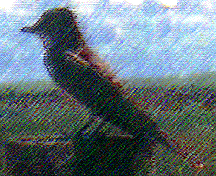|
Quote of the day: "It's not gonna stay where you guys put it." - a resident of East Providence |
| ||||||
|
| |||||||
|
October 8, 1998 |
|
dredged material management | |||||
|
|
|
| |||||
Copyright © 1998, Janet I. Egan |
|
I lugged the Corps of Engineers Environmental Impact Statement for the Providence Harbor dredging project with me to Starbucks this morning to review the sections dealing with Watchemocket Cove one more time before the public hearing. It's raining and the espresso machine is still broken. I don't know much about the EPA standards for dredged material management, or about dredged material management in general. I kind of wish I'd taken some civil engineering courses - I'd actually toyed with the idea of doing that - but it's too late now. However, I do know what birds use Watchemocket Cove. I mark up the EIS with all the species of birds they've left out. The rain gets heavier and heavier . After a quick supper, I hit the road at 5:00 figuring that's plenty of time to get to East Providence by 7:00. Wrong. The rain gets heavier as I go further south and so does the traffic. By the time I get to the hearing it's been going on for a little over half an hour. I have to park a fair distance from the entrance to the junior high auditorium so I'm wet and bedraggled looking. Signs on all the doors forbid banners and signs. There are about two hundred people sprinkled in clumps around the auditorium - the fisherman clump, the longshoreman clump, the East Providence residents clump... The auditorium is hot - or I'm sweating from stress - I'm not sure. The moderator stands at a podium on the stage and reads off the names of the next speakers. Two guys, one in military uniform, sit at a table on the stage and gaze impassively into the distance as they listen to each person's statement. A surreally large traffic light flashes green to yellow to red to remind the speakers when their time is up. The three minute limit is strictly enforced. Two microphones are set up on the floor in front of the stage on either side of the stenographer who is madly typing everything that's said. I sat down near some fishermen as Halsey(sp?) Herreshoff from the Bristol town council was speaking. "This is Rhode Island's bay," he said. "We're a million people who cherish this bay. We implore the federal government to be careful, to be sensitive." Another speaker referred to the bay as a "national treasure". Basically, the Corps is planning to dredge up 4 million cubic yards of sediment from the Providence River channel. The proposal calls for burying about a quarter of that, the most contaminated quarter, in a 40 foot deep, 48 acre pit at the north end of Watchemocket Cove (site 150). They want to drop the rest of it into a deep water hole between Prudence and Hog Islands (site 3) making a 340 acre 10 foot high mound in the bottom of the hole. The hole is rich in lobsters, crabs, fish, quahogs. The fishermen are not happy about losing the only deep water hole in the bay. My interest is more in site 150 because it is rich and diverse in bird life, particularly wintering ducks. Town officials from most of the East Bay towns, lobstermen, quahoggers, and "just ordinary citizens" all spoke. The fishermen accused the Corps of Engineers of "shallow science" or "not science". One lobsterman held up a piece of wire mesh from a lobster trap to show how juvenile lobsters could get through the mesh (that's the whole idea, to let the sublegals escape) and therefore the Corps' estimate of the lobster population was based only on legal size adults. A man with a Portuguese accent spoke passionately about how he didn't want to have to face "the children of Rhode Island" and tell them he'd let the bay be polluted. The lobstermen and quahoggers were the most eloquent speakers I heard. The most moving statement was from a woman who said her husband gave her a copy of The Biology of the Northern Quahog for their wedding anniversary, which she read and was very moved by. She spoke about quahogs like they were family, not just food and a livelihood. It's well into the hearing and so far most of the statements have been about Site 3. The only one who has mentioned Site 150, Watchemocket Cove, is a guy from East Providence who suggests taking all the sediment and completely filling in Watchemocket Cove because "it's half filled in already" and "no birds except swans live there". I blurt out - but blurt softly - "that's not true". A ripple of barely suppressed emotion runs through the room but doesn't erupt into anything. That surreal traffic light and the stern countenance of Lt. Col. whatever his name is seem to keep things under control . By the time a woman from the Audubon Society of Rhode Island gets up and comments on Site 150 I'm both breathing a sigh of relief and wondering how to condense two years of weekly observations and a whole lot of emotion into a coherent 3 minute statement. Somehow, I manage to do it.
I got all that said before the traffic light even came on. I reeled off the names of the ducks so fast that the official stenographer came over and asked me to repeat them after the hearing to make sure she got them all. The hearing ended. The rain continued. I decided to spend the night at Nancy's rather than trying to drive home in the deteriorating weather. Nancy dubbed me "extremely adequate Cove Shepherd" . | |||||
